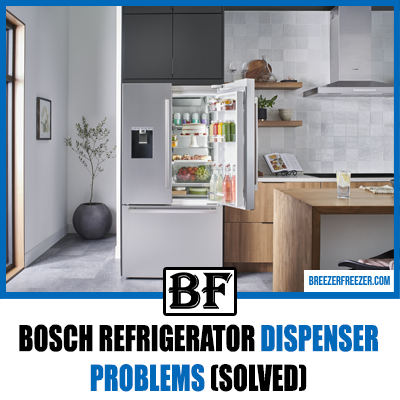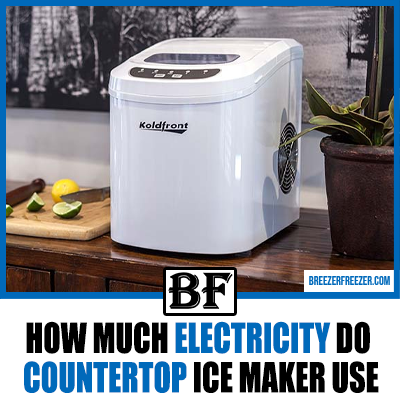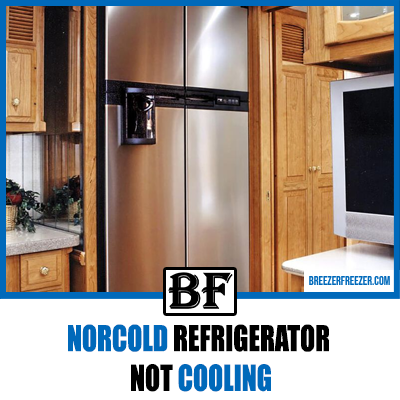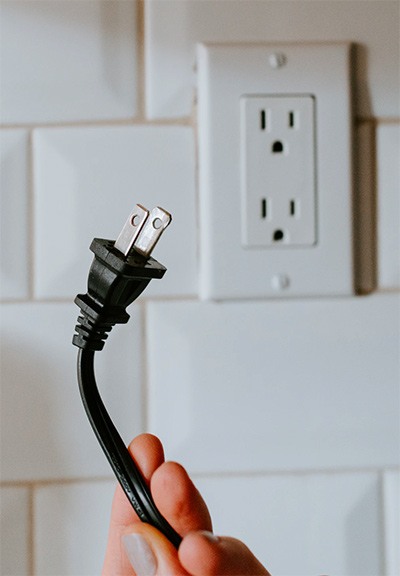Bosch Refrigerator Dispenser Problems (Solved)
As the refrigerator is a key component of a functioning household, finding it in a somewhat broken state makes us panic.

However, like any other electrical appliance, your fridge will have problems at some point. That’s why you need to be prepared and possess the knowledge to find out what’s wrong with the fridge to seek proper solutions.
Bosch, one of the leading manufacturers of refrigerators, is known for developing excellent fridges with advanced technology and German engineering. Even though they tend to last a long time without much trouble, a common problem faced by people is a malfunctioning ice and water dispenser.
To help you, we have created this guide on how to solve Bosch refrigerator dispenser problems. So, without further ado, let’s discuss all the details!
Parts You Need To Fix In A Broken Water Dispenser
One of the most common complaints about Bosch refrigerators is a broken water dispenser. Here are simple ways to inspect the dispenser and fix the problem yourself.
1. Dispenser Control Board
The dispenser system of the Bosch refrigerator is managed by the control board, so it’s the first thing you should check. If the board is faulty, it won’t be able to power the dispenser system.
Even when two or more parts of the dispenser seem to be broken, make sure to check whether the control board works. Because to fix this issue, you’ll need to replace the faulty dispenser control board before fixing the other components.
2. Dispenser Switch
It may come as a surprise, but one of the simplest reasons the dispenser may stop working is due to a faulty switch. The switch is there to supply the right amount of voltage to the dispenser for it to work.
You should use a multimeter to test whether there’s any response from the switch to determine if it’s responsible for the broken dispenser. Replace the switch if there’s no continuity, and the dispenser should work like before.
3. Door Switch
Another unsuspecting reason for a broken water dispenser can be the door switch. The refrigerator dispenser turns off when you open the door and starts back on after closing it. But, if it fails to turn on, check the door switch with a multimeter for continuity. In the case of a faulty door switch, you’ll need to replace it for the dispenser to work normally.
4. Water Filter
If you didn’t know already, the water filter in your fridge needs to be changed frequently to keep it working. Maintenance depends on several aspects, including the quality of water going into the fridge, but the usual timeline is four to six months. On failing to replace the filter, the water dispenser may start to dispense unclean water and then stop working altogether.
Not changing a water filter may even lead to deposits accumulating in the dispensing system, which might damage the fridge. So, if the dispenser of your Bosch fridge stops working suddenly, the filter might be due for a replacement.
5. Water Inlet Valve
Another part to check in a Bosch fridge is the water inlet valve to make sure it’s working fine. When the valve is broken, it won’t be able to send water to the dispenser at the usual pressure of 20 PSI. In case there’s a faulty inlet valve, check for continuity and replace it so that the water dispenser can work properly.
Along with that, this valve requires the water pressure to be between 20 and 120 PSI to function smoothly. So, make sure the water source connected to your fridge has a proper water supply. If not, you may want to disconnect the inlet valve, place it over a bucket, and turn on the water supply to check the pressure.
In most cases, the flow might be too slow and needs fixing for the dispenser to start working normally. But when the problem of low water pressure exists throughout your house, you need to contact the local public water systems office or seek help from a plumber.
6. Frozen Water Tube
One more reason the Bosch refrigerator water dispenser might not work properly is due to the water tube being frozen. This usually happens because the freezer temperature is below the usual 0-10 degrees Fahrenheit.
All you need to do is find the tube at the bottom of your fridge door, detach it, and blow air through one end to check whether it passes through. If the tube is frozen, let it thaw, tweak the temperature of the freezer, and reattach the tube to the fridge door.
Parts To Check In A Leaking Bosch Refrigerator Water Dispenser
Has the ice and water dispenser of your Bosch refrigerator suddenly started to leak? If yes, start the repair work by inspecting the following parts and replacing them with new components to have a dispenser that works without any issues.
1. Defrost Drain
One of the most common reasons why the dispenser of a fridge might be leaking is due to a frozen or clogged defrost drain. The drain usually gets frozen due to improper temperature settings, leading to water buildup in the drain trough and leakage from the bottom of the fridge.
To troubleshoot this issue, you’ll need to let the defrost drain thaw and clean it with warm water. Also, change the setting to the proper temperature, and the water dispenser should ideally stop leaking.
2. Water Tank Assembly
Along with the defrost drain, you should check the water tank assembly to make sure everything is in working order. At times, small leaks originate in the assembly, and it might be long before you figure out something is wrong. If there’s a leak in any part of the assembly, you need to opt for a replacement.
3. Water Filter Housing
One of the often overlooked Bosch refrigerator problems is a damaged water filter housing, which usually happens due to excess pressure while loading the water filter. But, there’s no need to worry as it’s easily fixable, and you can get affordable housing as a replacement.
4. Water Filter Head
Did you notice a continuous leak from the water dispenser of your Bosch refrigerator? It might be caused by a misplaced or damaged water filter head, so inspect the water filter and replace it with a new one if it is faulty.
5. Drain Pan
Most of the Bosch refrigerators you can purchase on the market are self-defrosting appliances. They usually have a drain pan to catch any water that is produced while the dispenser evaporator coils begin to thaw. Usually, the condenser fan has the job of circulating warm air to the drain pan for evaporation to begin.
When you find the drain pan to be dry, it might be an indicator that there’s a crack in some other part of the dispenser or the drain pan. Get it replaced as soon as possible for the dispenser to work correctly.
6. Water Inlet Valve
As we have told you in the previous section, the water inlet valve opens to allow water into the water dispensing system. However, if it’s broken, crooked, or loosely fitted, it won’t be able to supply water to the dispenser. And in some cases, this may even lead to noticeable leaks inside your fridge.
7. Water Filter
Do all the other components seem to be fine? In that case, the problem might be with the water filter in the dispenser. Typically, leaks are caused when water filters are ill-fitted or haven’t been tightened properly, so make sure they are securely held in place for the leakage to stop.
What To Do When The Bosch Refrigerator Water Dispenser Light Isn’t Working?
The light present in the water dispenser of a fridge might not seem essential, but it’s a savior when you need to fetch a glass of water at night. That’s why using the dispenser can be a bit frustrating when the light stops working and here are some things you can do to fix the light by yourself.
1. Check The Bulb
The very first thing you should do is check the bulb and carry out a continuity test with a multimeter to know whether it has a broken filament. Choose the Rx1 setting on your multimeter, then put one of its terminals on the bulb and the other one on the threading. If an infinite reading is displayed by the multimeter, replace the bulb with a new one.
2. Check The Light Sockets
If the bulb of the dispenser is okay, the problem might exist in the light socket. First, unplug the light socket and check for any discoloration or damage on the terminal – do change the light socket even if there’s only a slight sign of damage.
3. Check The Door Light Switch
Another probable reason for the water dispenser light not turning on might be a faulty door light switch. As you have noticed, the light usually goes off when you close the fridge door but when the door light switch is damaged, the dispenser light fails to switch on.
You’ll need to remove the door light switch and use a multimeter on the Rx1 setting to check for continuity. Ensure the multimeter probes touch the switch terminals properly to get a correct reading.
Usually, when the reading on a multimeter displays infinity to zero or vice versa, it indicates that the door switch of the refrigerator works properly. And if you fail to get such a reading, the door switch will need to be changed.
4. Don’t Keep The Dispenser Open For Extended Periods
Does your Bosch refrigerator come with a water and ice dispenser? If yes, then keeping the dispenser open for too long may damage parts like the bulb and the ice maker. When you suspect such a thing, make sure to test the dispenser components with a multimeter for continuity.
Always unplug before reseting the dispenser or testing it to prevent further damage. In case of inconclusive readings, contact Bosch customer care to get the dispenser parts checked and replaced.
How To Fix A Slow Bosch Refrigerator Water Dispenser?
Apart from the water dispenser not working, another problem in Bosch refrigerators can be a slow water dispenser. This usually happens due to insufficient water pressure in the water supply tube but there can also be other reasons. So, let’s check out what you can do to fix a slow water dispenser.
1. Check The Water Filter
Whenever your dispenser seems to be working slowly, the first component to check is the water filter and its installation. It is one of the most crucial parts of the entire dispenser system and even the slightest problem in the water filter prevents the dispenser from working properly.
Remember to change the filter at least two times a year to ensure that the dispenser system is free from dirt and mineral deposits. The dispenser will invariably slow down if your fridge has a clogged water filter.
When it’s your first time changing the filter, make sure to go through the instructions manual provided by Bosch. It usually contains information about how the water filter is to be removed and replaced. And you should always purchase original water filters from genuine Bosch outlets or sellers for quality water supply.
After replacing the water filter, check the flow rate and compare it to the initial flow rate it delivered when you bought the fridge. If it seems too low, the dispenser might have other damaged components. In such cases, it’s best to contact Bosch customer care to fix the issue and get proper water flow.
2. Pay Attention To The Water Supply Line
Homeowners often start blaming their refrigerators without realizing that the problem lies in the water supply that’s connected to the appliance. When your fridge is slow at dispensing water, it might be due to faulty pressure or a damaged water supply tube.
We also learned about instances of a frozen water supply tube, which occurs due to improper temperature control, especially in models with ice makers. If the water filter of the dispenser seems okay, move on to inspect the water supply line to see if it’s in proper working condition.
In case it’s kinked, straighten the tube and check whether proper flow is restored. But if it’s damaged, the only way to fix the water supply line would be to get a replacement.
3. Presence Of A Reverse-Osmosis Filtration System
Some households have a Reverse-Osmosis or RO filtration system, which may significantly reduce the water flow rate of a Bosch refrigerator water dispenser. If you happen to have one at your home, make sure to get a separate water supply line for the dispenser that isn’t linked to the RO filtration system.
4. Check If The Dispenser Is Evenly Leveled
No one enjoys reading the user manual provided by the brand, but to maintain proper water flow in your Bosch fridge dispenser it’s necessary to read the instructions. It will usually have information about troubleshooting the dispenser in case there’s slow water flow.
One of them should be about maintaining a proper alignment for the dispenser to ensure uninterrupted water supply and proper water pressure. Bosch recommends using the bolts underneath the fridge to ensure proper leveling.
Unlocking The Water Dispenser In A Bosch Refrigerator
Are you unable to find any fault that might have caused the dispenser to stop working? It might be something as simple as the bosch refrigerator water dispenser is locked, which you can determine when you see a lock symbol on the control panel. When the lock is turned on, the ice and water dispenser of your fridge will stop working until the setting is disabled.
Even though the setting may differ between Bosch fridge models, you can usually unlock it by pressing the lock key for a few seconds until there’s a loud beep. Then, you should be able to use the water dispenser and control panel again.
Final Words
That’s everything we had in store for you today. We hope our tips will help you detect and fix various issues that might occur in the Bosch fridge dispenser.
On that note, we want to mention that if you have a Bosch refrigerator under warranty, it’s always better to get it fixed by the company. You can contact Bosch customer care, and a representative will visit your home to fix the dispenser.
We cannot stress enough that reading the user manual is essential before starting to use your fridge. And, you should make it a habit to clean your fridge and the water dispenser frequently to ensure error-free operation.
In case you aren’t used to handling electronic appliances, don’t forget to ask for help from professionals. They are also trained to deal with more complicated problems in your fridge and offer efficient solutions.
Until next time!





